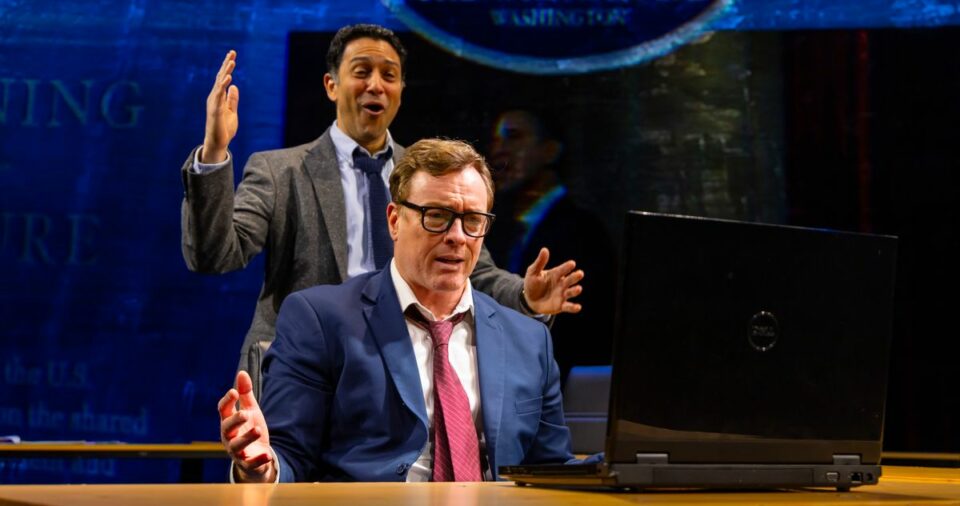In his 2017 review in the Times, Ben Brantley called J. T. Rogers’s Oslo “undeniably a big play.” That’s a value-neutral statement, though he followed it up with plenty of praise. My predecessor here, Jesse Green, was positive, and so was the consensus. Oslo—which told the behind-closed-doors story of the 1993 peace accords between Israel and the PLO, facilitated by a pair of audacious Norwegians—won the Tony. It was the second major collaboration between Rogers and Bartlett Sher, who also directed the playwright’s Blood and Gifts in 2011. That’s the behind-closed-doors story of the 1980s power struggle over Afghanistan. And now, we’re getting Corruption, another undeniably big Rogers and Sher joint, this one the behind-closed-doors story of how a gutsy gang of journalists, lawyers, and politicians took on Rupert Murdoch’s morally rotten media empire and … well, not exactly won, since Murdoch and his ilk are clearly doing just fine, but didn’t lose. They called a seemingly untouchable power to account and pointed a cautionary signpost toward the venal “post-truth” reality we’re all now living in. The really heartbreaking question of it all was and remains: What difference did it make? When the truth is spoken, is anyone listening? Who actually cares?
That last question should plague Corruption’s characters, and us in the audience, from a diegetic, ethical perspective. Unfortunately, it’s also the question that arises externally around Rogers’s play, which spends close to three hours telling us in no uncertain terms just how important its subject matter is but makes us feel next to nothing. The frustrating thing is that the play’s not wrong—this stuff is important, and shocking and heinous and full of perilous real-life stakes—but you can be right all day long without making something compelling.
Corruption sets up the story of the Labour MP Tom Watson, his fellowship, and their battle against Murdoch-Mordor as a David-and-Goliath fable. The characters themselves even draw the parallel: “You take your slingshot, you take your stone, and you let it fly!” Tom (Toby Stephens) rallies his colleagues at the play’s midpoint. But the irony is that the show itself feels more lumbering giant than scrappy young hero. Its numbers are clearly intentionally big, to suit its stakes and scope—85 scenes with 13 actors in “over 50 roles,” says Sher, though I count 46 in the program—but they don’t add up in more than quantity. As the stage crew members (who really deserve a drink) maneuver the neutral, office-style rolling tables of Michael Yeargan’s set around for the 56th time, and an actor arrives in another variation on the same blue suit, playing another newscaster, or politician, or “Male Suburbanite,” it ceases to matter how much Sher leans on the pace, or how much Stephens tries to play the urgency. The truth is that they’re both pushing, overcompensating for a text that’s all expositional surface.
Rogers is so busy making sure we know where we are (“10 Downing Street,” “Gandhi’s Indian Restaurant,” “Mosely Mews House” read a cortège of projections) and who’s talking (characters are constantly using each others’ full names, even for their spouses), that he never really invests in who these people are. We do get a few scenes of strained domesticity: Tom’s wife, Siobhan (Robyn Kerr), walks out on him with their son because, as she tells him dramatically, his righteous quest will “destroy our family”; Tom’s ally, the lawyer Charlotte Harris (Sepideh Moafi), feeds him lasagna, shouts at her offstage kid to go to bed, and admits that she too is down a spouse thanks to dogged pursuit of the truth. But these pictures of private life, too, are thin and flat — stock relationships and interactions meant to give the impression of deeper life. Is it truly so far-fetched, so anti-dramatic, to imagine the wife of an underdog moral crusader whose response is reasonable and human, one who says, “I share your values and I support you. And I understand that we’re at risk, which is definitely scary. [Generic Kid Name] and I are going to stay with my parents for a while, but I love you, and I believe in what you’re doing, and please call me every night”? Rogers eventually tries to pivot to something along these lines: He gives Siobhan the grand Our family can’t take this anymore! exit, but then, with minimal psychological effort, he bends her back around into being Tom’s most serious advocate, a voice of wisdom that—in a labored gesture near the play’s end—even speaks truths out of the future. “You make them hear you, Tom Watson,” she tells her husband, in a fit of full-name grandiosity, as he prepares to speak before Parliament, “And you make that woman pay.”
“That woman” is Rebekah Brooks (Saffron Burrows). She’s our Big Bad, anointed by Daddy Murdoch, who hovers over the play rather than appearing in it, and it’s on her watch as CEO of News International that the crimes Watson and co. are specifically targeting were committed. In the early 2000s, reporters for one of her papers, News of the World, hacked into thousands of phones, from those of celebrities and members of the royal family to those of regular citizens, including victims of the 2005 London bombings and a murdered 13-year-old girl named Milly Dowler. (Ire around the Dowler hacking ultimately helped light a public fire under Watson’s cause.) Watson and his allies—including Independent journalist Martin Hickman (Sanjit De Silva); Guardian journalist Nick Davies (T. Ryder Smith); Labour MP Chris Bryant (K. Todd Freeman); Harris, who represented the phone-hacking victims; and Max Mosley (Michael Siberry), the eccentric-is-a-nice-word-for-it aristocrat who helped fund all the lawsuits—succeeded in revealing bone-deep strata of collusion and corruption in the power players of the British establishment. News International had Scotland Yard by the balls, and its editors and executives were shameless kingmakers — with political party never as important as what they got out of the deal. One of the victories of Watson’s investigation was that it forced the cancellation of a merger between Murdoch’s corporation and the television broadcaster BSkyB. (Which, as De Silva’s Martin Hickman is made to inform us, in case we didn’t get it, would have given Murdoch “a complete media monopoly.”)
If all this is sounding kind of like your favorite HBO show—or maybe you hated it, but it was an Undeniably Big deal—that checks out. Succession’s Logan Roy and his family of “little Machiavellian fucks” was more than a bit inspired by the Murdoch dynasty. Whether or not Corruption’s producers are deliberately trying to ride the Waystar Royco wave, or whether Rogers’s play simply bubbled up from the same seething mud pit, who can say? Either way, it’s a bold move to jump right into the storytelling arena of one of the sharpest, darkly-funniest, best acted, and most awarded TV shows in recent memory, and Corruption can’t stick the landing. Succession was made up of people— mostly awful, but weird and complicated and fucked-up and ickily sympathetic. Corruption is made up of plot points.
At one point, through Ryder Smith’s Nick Davies, the play tries to pull off one of those nudge-wink moments that seem to imply wry self-knowledge: “They will not understand this story,” says Davies to his editor at the Guardian, scorning the idea of getting the New York Times to pick up the scoop, “its complexity nor its Britishness.” If Rogers thinks he’s cutting off objections at the pass, well, sorry. Neither complexity nor Anglocentrism is the problem here. The problem is a failure to access any part of us below the neck. This is the trouble with history plays that go broad but not deep: If they fail to activate the muscles of our caring, then we leave the theater colder than when we entered it. Something real that deserves our outrage has, in story form, merely provoked our indifference. And that is a dangerous cycle.
Corruption is at the Mitzi E. Newhouse at Lincoln Center Theater.
Related
- Theater Review: Oslo Crackles With Drama, and Gives Peace a Chance
Sara Holdren , 2024-03-12 02:25:56
Source link


